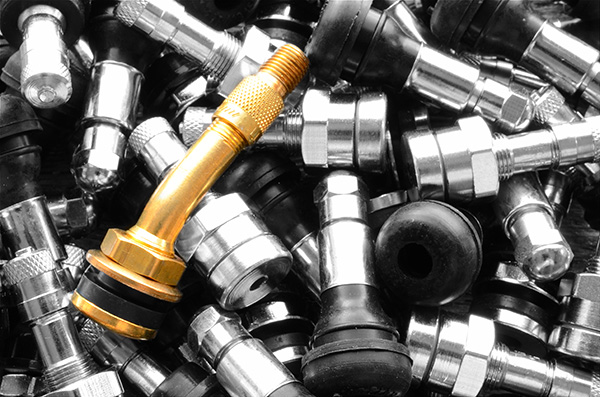
It’s happened to all of us: we come out to our car, ready to drive, only to notice that one of the tires looks a bit flat. While it’s tempting to blame nails or potholes, sometimes the issue lies in a much smaller and often overlooked part of the tire—the tire valve stem. The tire valve stem is a vital element that allows air into your tire and keeps it there. If it's compromised, even slightly, it can lead to slow air leaks that may be hard to detect at first but can lead to more significant issues. So, how do you know if your tire stem is leaking?
Signs Your Tire Valve Stem Is Leaking
Not sure if the air loss is from a puncture or the stem? Here are some clear signs to look out for:
Consistently Low Tire Pressure
One of the first and most obvious signs of a leaking valve stem is that your tire pressure drops more quickly than normal. If you find yourself constantly having to add air to one particular tire, the valve stem could be the culprit. While it’s natural for tires to lose some pressure over time, excessive air loss indicates a problem that should be addressed.
Visible Damage or Cracks on the Valve Stem
Over time, the rubber components of the valve stem can crack due to exposure to weather elements and regular wear and tear. Check your tire stem for any visible signs of damage, such as cracks or a loose-fitting cap. Even a small crack can cause a slow leak, which may eventually lead to a flat tire if not repaired.
Hissing Sound
A distinct hissing sound is one telltale sign that air is escaping from your tire stem. You likely have a leak if you place your ear near the valve and hear this noise. This sound occurs when air is escaping under pressure, and it's a clear indicator that the valve stem is compromised.
Bubble Test
A simple yet effective way to determine if your tire stem is leaking is the bubble test. Apply soapy water to the valve stem, and if you see bubbles forming and expanding, that indicates a leak. This method is a reliable way to pinpoint where air is escaping.
What Causes a Valve Stem Leak
Valve stem leaks can occur for several reasons, and understanding these causes can help you prevent further issues.
Aging or Deterioration of Rubber
Just like any other rubber part on your car, valve stems can wear out over time. Exposure to the elements, especially extreme temperatures, can cause the rubber to dry out, crack, and lose its ability to hold air effectively.
Debris or Dirt
Dirt or debris can get inside the valve stem and affect the proper sealing of the valve. This often happens if the valve cap is missing or damaged, exposing the stem to contaminants that can create small gaps and lead to air leakage.
Improper Installation
Sometimes, valve stems are not installed properly during tire replacement or maintenance. A poorly fitted stem may not seal correctly, allowing air to slowly leak out of the tire. Always ensure that new valve stems are correctly installed by a professional.
Corrosion
Metal valve stems, in particular, are prone to corrosion, especially in areas with harsh winters where road salt is commonly used. Corrosion can weaken the stem and lead to cracks or gaps that allow air to escape.
What To Do If Your Tire Stem Is Leaking
If you suspect your tire stem is leaking, there are a few options to consider depending on the severity of the leak.
Replace the Valve Stem
In many cases, replacing the valve stem is the most effective solution. A new stem can be installed relatively inexpensively, and it’s a straightforward job for any tire repair shop. If the stem is cracked or corroded, it’s best not to delay and get it replaced to avoid further air loss and potential damage to your tire.
Tighten the Valve Core
Sometimes, the valve core (the small pin inside the valve stem) may have loosened over time, causing air to escape. A valve core tool can be used to tighten it. Be careful not to overtighten, as this can damage the valve.
Use a Temporary Fix
If you’re in a pinch and can't get to a repair shop immediately, tire sealant can temporarily fix a valve stem leak. However, this is not a permanent solution and should only be used as a stopgap until you can get professional assistance.
Get a Professional Inspection
If you're unsure about the source of the leak or whether the stem needs to be replaced, it’s always a good idea to visit a professional tire shop for a thorough inspection. They can quickly diagnose the problem and provide the most effective solution.
Can You Prevent Valve Stem Leaks
While wear and tear are inevitable, there are steps you can take to reduce the chances of a valve stem leak. Regularly inspect your tires and valve stems for any visible damage, and replace the valve caps if they’re missing or damaged. Make sure to schedule tire maintenance regularly to catch potential problems before they become major issues.
In addition, keep an eye on your tire pressure. If you notice significant drops in pressure over a short period, don’t ignore it. It’s better to get it checked out sooner rather than risking a flat tire on the road.
Is your tire constantly losing air? It could be your valve stem! At Hometown Tire and Auto, we can quickly diagnose and fix any tire issues you’re experiencing. Come in today for an inspection!